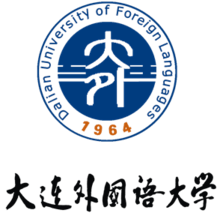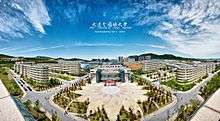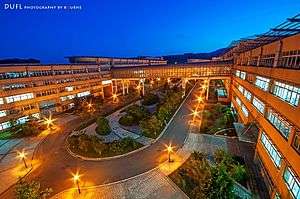Dalian University of Foreign Languages
Dalian University of Foreign Languages (DLUFL; simplified Chinese: 大连外国语大学; traditional Chinese: 大連外國語大学; pinyin: Dàlián wàiguóyǔ dàxué) is a public university in Dalian, Liaoning, China and one of the top foreign language institutes in mainland China. Formerly known as Dalian School of Japanese Language, DLUFL was founded in 1964 with the help of the late Chinese Premier Zhou Enlai. It is now under the administration of the Education Commission of Liaoning Province. Through 40 years of development, DLUFL has fledged into a multi-disciplinary foreign language university which also offers programs in other fields like arts, economics, management, engineering and law.

| Dalian University of Foreign Languages | |||||||
|---|---|---|---|---|---|---|---|
| Chinese name | |||||||
| Traditional Chinese | 大連外國語大學 | ||||||
| Simplified Chinese | 大连外国语大学 | ||||||
| |||||||
| Abbreviated as | |||||||
| Chinese | 大外 | ||||||
| |||||||
| Korean name | |||||||
| Hangul | 대련외국어대학 | ||||||
| |||||||
| Japanese name | |||||||
| Kanji | 大連外国語大学 | ||||||
| Kana | だいれんがいこくごだいがく | ||||||
| |||||||
| Russian name | |||||||
| Russian | Даляньский университет иностранных языков | ||||||
大连外国语大学 | |
 | |
Former names | Dalian Foreign Language Institute (Chinese: 大连外国语学院, 1978 - 2013) |
|---|---|
| Motto | 崇德尚文,兼收并蓄 |
| Type | Public |
| Established | 1964 |
Academic staff | 900 |
| Students | 20000+ |
| Undergraduates | 10000 |
| Postgraduates | 7000 |
| Location | , , |
| Campus | Urban |
| Website | www.dlufl.edu.cn |

Campus
In 2007, the university moves its main campus to Lüshunkou District. Its Dalian City Campus remained until 2013, when the School of Chinese Studies also moved to Lüshunkou District. The Lüshun Campus nestles under a mountain and is faces the sea, spanning over 1,260,000 square meters (311 acres), with a building area of 500,000 square meters (123 acres). Mingyang Lake, an artificial lake on the campus, is a favorite scenic spot for students and local residents.[1]

Facility
The library of the university holds 765,000 copies of books and 600,000 electronic books with the electronic reading rooms.
History
With the help of the late Chinese Premier Zhou Enlai, DLUFL was founded in 1964 to teach Japanese language, and in the 1970s, the English school and the Russian school were established. Other language departments were then built to meet the needs of Economic reform in China, which began in 1978. In the mid-1980s, the university was authorized by Ministry of Education of the People's Republic of China to offer postgraduate courses.
Administration
Faculty
DUFL has a highly competitive faculty. Among the 1,000 faculty and staff it employs, 300 have Professor or Associate Professor titles. There are 10 prominent professors receiving the Special Allowances from the State Council of P.R.C.[2] In order to promote diversity and an internationalized campus culture, it regularly employs over 60 foreign teachers from 15 countries including but are not limited to the United States, Japan, Russia, the United Kingdom, France, Germany, Austria, Canada, Australia, and the Republic of Korea.
Programmes
DLUFL offers 20 bachelor programs among which 10 lead to master programs. The 20 bachelor programs including Japanese, English, Russian, French, Korean, German, Spanish, Arabic, Portuguese, Italian, Chinese, Chinese Literature, Teaching Chinese as a Second language, Art Design, Tourism Management, International Economics & Trade, Computer Science & Technology, Information Management and Information Systems, Computer Software Engineering, Journalism and Music Studies are named key disciplines at the provincial level.
Language Training and Testing Centers
DLUFL administers over 20 language tests such as TOEFL, GRE, HSK, JLPT, BJT, KLPT, and WSK.
Notable alumni
- Liu Xiaoming, China's Ambassador to the United Kingdom.
- Chen Naiqing, China's Ambassador to Norway.
- Yu Shayan, Deputy Governor of Heilongjiang Province, China.
- Liu Qian (Lucy Liu Scott), CEO, Author
References
External links
- Official site
- School of Chinese Studies (in English)